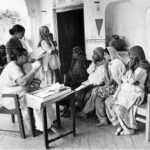 DFG project „Hidden Histories: Women in Rural Development Programmes in India, c. 1920-1966“ (Web) and DFG Research Group „Voluntariness“; Maria Framke (Erfurt Univ.) and Rosalind Parr (Glasgow Caledonian Univ.)
DFG project „Hidden Histories: Women in Rural Development Programmes in India, c. 1920-1966“ (Web) and DFG Research Group „Voluntariness“; Maria Framke (Erfurt Univ.) and Rosalind Parr (Glasgow Caledonian Univ.)
Time: 04.-05.07.2024
Venue: Erfurt
Recent years have seen renewed interest in the global history of development producing a spate of field-defining publications that explore the complex implications of modernisation projects across the decolonising Global South. This wide-ranging historiography includes accounts of Euro-American neo-colonial dominance, the role of international organisations, and Cold War-motivated projects alongside attempts to uncover global genealogies of development from Global South perspectives. Notwithstanding an emerging body of scholarship on women and development in national contexts, the perspectives of Asian and Africa women remain neglected in these global histories.
The workshop seeks to bring histories of voluntariness, women/gender and development in Asia and Africa into conversation with the global history of development. The aim is to explore the ways women in Asia and Africa authored, experienced and shaped development from the 1920s to the 1970s and to understand the relationship between ‘development’ and other political, social, and economic agendas. As the focus is on non-state initiatives, the exploration of ideas and practices related to voluntariness will be crucial for our discussions. The organisers adopt a broad definition of development that incorporates diverse visions of postcolonial ‘nation-building’ and other forms of ‘improvement’ that took place at local, national, regional, and international levels. This includes, but is not restricted to, non-state initiatives in the fields of health, population, education, women’s empowerment, rural regeneration, and urban planning. The organisers believe that this framing provides exciting opportunities for engaging with diverse historiographies and may invite reflections on the value of global and transnational history in this context. Read more and source … (Web)
